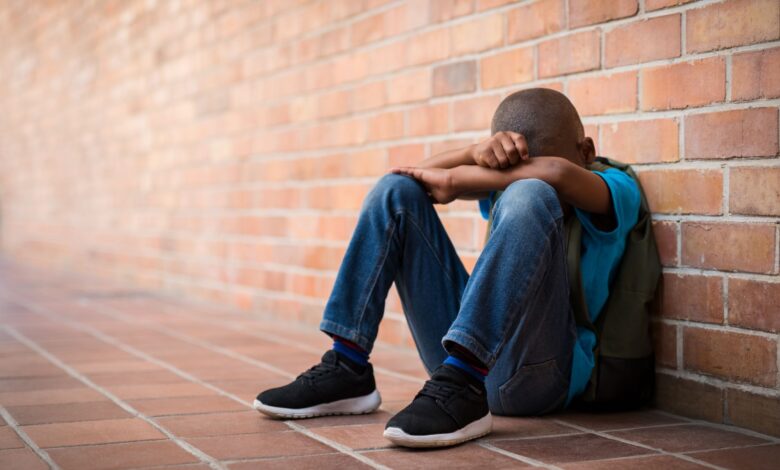10 Telling Signs That Your Child Is Being Bullied At School

10 Telling Signs That Your Child Is Being Bullied At School. Parents take their children to school for them to get an education so as to secure a better future. Unfortunately along the way, they go through the most, include being bullied by other pupils or worse teachers. Just this Monday, a Grade 10 student in Limpopo, Lufuno Mavhungu resorted to taking her own life to escape the pain of being bullied.
The thing is, it is sometimes difficult to tell if your child is suffering at the hands of bullies. They may act normal only for you to realize when the problem has escalated. The following 10 signs will go a long way to help you realize that something might be amiss with your child. These signs don’t necessarily mean your child is being bullied though. They could be signs of other issues, like depression. However you should still take these signs seriously.
1. Troubled Sleep
If a child is nervous or anxious about what might happen the next day at school or elsewhere, he or she could experience difficulty falling asleep, or anxious tossing and turning. A child who seems more tired at breakfast or just looks more worn out than usual, could be showing signs they’re having trouble sleeping at night. An inability to focus or maintain proper hygiene can indicate anything from sleep issues to bullying and depression.
2. Reluctant To Go To School
Because school is a hot spot for bullying, a child’s reluctance to wake up and head out in the morning could signal that something is amiss. Mondays are the most common day for wanting to avoid school. With younger children, watch for recurring excuses to stay home, such as aches and pains. With adolescents and teens, check in with teachers periodically to monitor attendance, as this age group is more likely to skip school altogether.
3. Sudden and Significant Drop in School Performance
No student can excel in their studies when they experience bullying at school. If as a parent you notice that your child’s performance has dropped dramatically, this could be an indication that something is wrong. You can notice this if you are a parent that is always involved when it comes to their child’s school work. Although it may not necessarily be down to bullying, poor performance is something that should get your attention.
4. Requests For Money or Other Items
Consider it a sign when your child starts asking for money or certain items during school days. Chances are that he or she is being bullied. To show their power, bullies always want to take things that do not belong to them by force. If your child suddenly takes stuff to school, the person doing the bullying might be demanding money or things like lunch box treats from your child.
5. Unexplained Loss of Possessions
If your child keeps on losing stuff, there could be more to it. Bullies will often take things from other children by force or coerce them into giving them money or other possessions. As a parent or guardian make sure you keep a close eye on your child’s toys and gadgets. If they lose stuff repeatedly do not dismiss it as a case of carelessness, try to get to the bottom of it.
6. Crying Spells or Intense Emotional Reactions
If your child has intense emotional reactions toward conversations about school or social activities, it could be a sign they’re holding anxiety around those events. In younger kids, this tends to focus on discussions around school. Whereas, in high school they’ll become more emotional about Friday and Saturday nights. Either way, you’ll notice an emotional jag, or an unwillingness to delve into the subject.
7. Keeping To Themselves
If a child is not as talkative as they normally are, or if they go straight to their room after school, those could be things to look out for. Acting out against siblings could also be a sign of prolonged bullying. Isolation or loneliness are common feelings for people suffering from peer abuse.
8. Obsession or Withdrawal From Devices
If a child’s bullying takes place online, you might notice one of two things: an over-attachment toward electronic devices, or a complete withdrawal from them. If it’s the former, the child could get agitated if you try and limit their usage. With the latter, you might find the child difficult to get a hold of (because they’ve withdrawn from their devices).
9. Torn Clothing and Physical Marks
Inexplicably torn, ruined, or stolen clothes and belongings, along with physical scrapes or bruises, are trademark signs of playground bullying. When the parents asks about these things, the child tends to either not be able to explain them, or not want to explain.”Again, ask open-ended questions like, “What happened today during break?”; “How did you feel when that happened?”
10. Starts Bullying Siblings or Younger Kids
The bullied will often become bullies themselves, taking their frustration and emotional distress out on anyone weaker or more vulnerable than themselves. In some cases, a bullying victim will drop the “victim stance” and become reactive with siblings and other kids instead. This cycle can create a toxic environment in schools where bullying goes unchecked or becomes normalized behavior.




